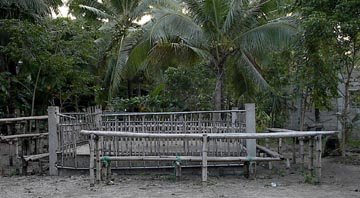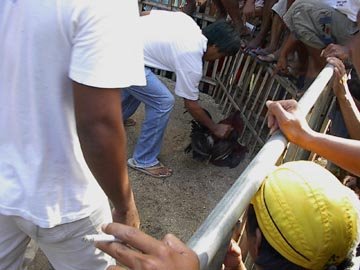Friday, April 28, 2006
Condos and Chickens: Will They Kiss and Make Up?
It turns out, as I suspected, that having chickens next door is a selling point. "We've had people calling from as far away as California, asking if this was the condo project with the chickens," Todd told me. "They also like the idea of a place where the front page news is chickens, not murder or rape."
(Note to prospective buyers: we do have crime here. )
It sounded like Todd had been enjoying the crowing on the job site. He had become friends with the owner of the poultry. He even offered to house the birds in his own yard. Now he has that excited look that my husband gets when he's planning to build a new yard toy for the kids, but he says we'll all just have to watch the paper to get the details.
Monday, April 24, 2006
So You Want To Move To Leelanau........

Every year, more people move to Leelanau, looking for the quiet rural life. New neighbors are usually a blessing, but sometimes they seem a little lost. A few seem hell bent on turning Leelanau into the same place they left. You tend to wonder why they came here.
Rural America is not just suburbia with better scenery. It is not "the land that time forgot". It is also not the Great Frontier, waiting for someone to smart enough to exploit it. Things are different here, in ways that you may not expect or appreciate. The case of the Chickens Vs. The Condos is the most recent example, but it is only one.
This is an interactive post. I want my Leelanau County readers to help Brother Chris with his Extended Ed class for area newcomers. What do you think a person needs to know before they decide to move to Leelanau? I'll start, you can add your own ideas using the comments:
- Those hills of flowering blossoms and green pastures with black and white cows, although they are scenic, are actually working farms. You can expect to smell manure on occasion, and sometimes you may catch a whiff of Captan. You will sometimes find a tractor or cherry shaker driving down the road ahead of you, especially if you are in a hurry. During cherry harvest, when the weather is hot and sticky, you may be awakened at intervals throughout the night by the sound of cherry hauling trucks and their "jakebrakes". None of this is anything to complain about. Every year that we have a good harvest is another year that farmers can afford to stay in business and those hills aren't being sold off for subdivisions. If the rest of the world hits a rocky spell, you may be depending on local farmers for your sustenance. Support local farmers, both in spirit and by patronizing our fine farm markets and wineries.
- Working farms also need all kinds of expensive machinery. Farm machinery is built for service, not for style. It is not uncommon for a tractor or implement to remain in service for 20 or 30 years, or longer. Even disused machinery is kept around for parts or for occasional service, or even for sentimental reasons. Even non-farmers will keep an extra car around for parts or in case their main car goes on the blink. They may keep a boat on a trailer, hoping to one summer find time to use it a time or two. Don't move here and then complain about "junk" in other peoples' yards.
- Don't be afraid of the dark. If you really need a yard light, find a sky friendly one, and turn it off when you aren't using it. We know you're real proud of your new mega-mansion, but we don't need to see it lit up all night, especially if you've gone back to Florida for the winter. We'd rather see the stars.
- Leelanau is not a big city economy. It is a seasonal economy. Around the end of March you will find a lot of people quietly stretching their last few bucks until their income picks up again. Leelanau is also an area of underemployment. Underemployed people are those of us who can't find jobs that match our education. At least we can find work. Don't talk down to people! There is a good chance that your plumber or snowplow driver are better educated than you. By the same token, if you are moving here on the strength of your Master's degree in Russian Lit, it wouldn't hurt to learn to plow snow.
- People move here for the scenery. The smart people learn that the real treasure here is the community. Up north you need your community. Try not to piss off your neighbors. They may be the ones pulling you out of a snowdrift next week.
- Volunteer. There are all kinds of organizations doing all kinds of work with volunteers. Find a place where you feel comfortable, and then help, even if it's only a little. You will meet the most interesting people and you won't have time to cruise to mall and pine for stuff you can't afford on a local paycheck.
Friday, April 21, 2006
Chickens vs Condos
On March 30th, the Enterprise ran a front page story about a complaint that had been lodged by the local sales manager of the new condominium project in Suttons Bay. It seems that the neighboring farm includes chickens, some of which are crowing roosters. The sales manager complained to the village council that:
It is constantly crowing, which in turn is making it difficult to show that particular property (to prospective buyers). I understand that our neighbors are not zoned to have a farm on that property, yet they have several chickens, ducks, and a rooster in a pen, located near the water.It is hard to figure out what she was thinking. She must not be too familiar with small town life. Village officials responded quite confidently that the chickens were OK. To quote village manager Chuck Stewart:
That farm has been there for about 150 years. I'd say it predates our zoning ordinance by well over a century. Besides, there's nothing in the village zoning that prohibits anyone from keeping chickens within the village limits. Several families keep chickens, one family has goats, and another even keeps horses inside the village. This is Northern Michigan, after all, and we're proud of our agricultural heritage.
The sales manager should use the poultry as a selling point. Fresh Eggs Next Door! Around the same time that this story broke, I was hosting web ads for Omlet USA, a backyard chicken supplier that custom ships a utra-fashionable coop with hens right to your home. I was especially taken with their page of fashion magazines with articles on backyard chickens. Chic chicks!
I guess the poor woman really didn't figure that her complaint would not only be spurned, but would run on the front page of the Enterprise. Even I was surprised about the letters to the editor, three weeks running, on this issue. They seemed to have tapped a deep vein of discontent towards people who want to move to Leelanau because it is so "unique" and then set out to change it to be more like everyplace else.
Known Books has posted a page of Suttons Bay Roosterisms.
Thursday, April 13, 2006
At the Wheel


Anna took this picture from the backseat as I was backing up in the Plymouth Horizon. It was the last day I wore my winter coat. At these gas prices, the Horizon is my favorite car. Yesterday Richard read that a Prius only gets 29 miles to a gallon. I think the Horizon does better, but it's hard to tell because the speedometer sometimes stops working.
Sunday, April 09, 2006
A Cockfight in the Philippines
Why post a story about a cockfight? I'm curious about the many ways that humans and chickens have evolved together, there's one reason. I'm continually frustrated by the public dialogue about avian flu, and the assumption that the normal way to keep chickens is in large egg or meat factories. The world needs to know more about what people do with chickens, even cockfights. Cockfighting is legal and popular in the Philippines. It is even televised, with its own commercials for cockfighting supplies. Yet, the Philippines is among the few nations in that part of the world that is still free of avian flu. Go figure.
There are some four-letter words in this, and violence, of course, so if you don't want to read it don't, but here it is:
After taking a PAL flight from Manila to Roxas City, I was treated to a three hour boat ride, on my brother-in-lawÂ’s boat, to the far away island of Jintotulo. Please keep in mind this boat had four adult passengers, two teenagers, a small child and a crew of four.
"A three hour cruise, a three hour cruise." The tiny ship was rocked and I arrived there looking like a drowned rat and feeling like a Viking. When I got to Jintotulu (where my wife is from and her parents live) I got to go to a cockfight!
This was the highlight of my trip and a very JamesBondian experience.
Note the bleachers around the pit. The locals move out of my way in order to give me a prime space to watch. There were no women or girls present. Everyone then starts to shout to the ringmaster in the center of the ring. Obviously they were making bets on either the white cock or the red one. I wasn't going to bet on the first match but after a couple of minutes the ringmaster looks at me and says; Hey Joe, you want to bet three hundred? I said; Yes, three hundred on the red one (pointing to the cock on my side of the ring). He waved his hand and with a smug expression indicated I had no bet. He then looked at me and waved his hand towards the opposite side of the ring. I then realized that since us bettors weren't laying odds or giving up points, he was trying to even up the betting at my expense. A minute later he asked me if I want to bet 500. I said yes and again pointed to the red bird. He waved off my bet and then grabbed himself in a Michael Jackson fashion, as if to dare me to bet on the white cock. Meanwhile the referee is writing down the bets in a spiral ring notebook.
The other man in the pit (the referee) then held a bird in each hand, faced them towards each other and released them. My bird scored the "dim mak" the other bird didn't die but was obviously unable to continue. This however, being a "fight to the death" the referee would grab a bird in each hand and face them off again. This process was repeated until the white cock was deemed to be dead.
Now all eyes are on "Joe" because he picked the winning cock, even though I hadn't won anything. At this point one of my nephews-in-law brings me a glass of "halo halo" which is a delicious Filipino desert made with shaved ice, jellied fruit and sweet cream. He explains that I'm sitting on the side of the ring for the first time birds. The experienced birds are brought to the other side of the ring. My oldest brother-in-law then tells me to "go look at the birds" and points to an area near a very old tree that is about 20 feet from the ring, where all the bettors are gathered.
This gathering is the equivalent of the "cock weigh-in" and there are six bird owners holding their prized cocks (birds). They hold the birds while facing them to each other in order to determine the two birds that display the most animosity towards each other. There is a lot of talking going on and I can tell the organizers are getting a feel for whether the betting will be equal in a match between the birds in question. I look at the old tree and I see how they disposed of the losing white cock: by dumping him unceremoniously at the roots of the "tree of woe."
After the contestants are selected, the owners begin the process of tying and taping the three inch long curved blades to the left ankle of their bird. In some cases these blades are selected from a collection displayed in a wooden case that was probably more accustomed to containing expensive silverware in its previous life. After the cocks are ready everyone returns to the ring and the shouting starts immediately. The cocky (pun intended) ringmaster looks at me and asks if I want to bet 500 Filipino money (10 USD). I said yes and pointed again to the red cock. He seems to book my bet and I look to my brother-in-law and ask him if I have a bet. He says that he doesn't know because he doesn't bet on cockfights. I said I just wanted to know if I have a bet or not and he finally says he thinks I do.
The referee released the birds and my bird jumps high and seems to drive its blade in the chest of his opponent. Everyone (including the chickens) knows that the white cock is doomed. The referee continues to pick up both birds and face them off, even though the white bird merely hangs there limply. After he releases the birds, my bird merely pecks at the face and eyes of his adversary. He is taking no chances of getting close to the other bird's feet, where a voluntary or involuntary kick could send him to the tree of woe.
Now please don't think harshly of me because at this point and I stand up and scream; "FINISH HIM!" which brought cheers from my brethren of those that bet on the red cock. The white cock was finally declared dead (it looks strange seeing the referee check the bird's wrist for a pulse) and I stand up again to join my comrades in a barbaric roar.
The organizers then collect the losing bets, which are generally crumpled and thrown angrily to the center of the pit. I ask my brother-in-law if I should ask for my money and he tells me not to worry. The referee then comes to me and hands me a 500-peso bill. I smile, thank him and display my coin purse as I gingerly shove the bill into it. I announce; "It was a pleasure doing business with you." This brings roars of approval from everyone in the pit area.
The third bout was a replay of the first: cocky ringmaster won't book my bet and my bird ends up winning.
Now "the legend of Joe" is truly born and I strut to the weigh-in like I'm Nick the Greek. I have my eye on one red cock that will face another red cock. The owners tape the blade one of the birds with blue tape so us bettors can tell them apart. The ringmaster then announces; "In this corner with the blue trunks (OK, tape) is a SIX time championnnnn!!!!" He then immediately looks at me and asks if I want to bet five hundred. I was not naive enough to believe that this bird was a six-time champion but that cock was scratching the ground with his claws (which I took to be a sign of aggression) while his opponent merely stood in the ring, looking around like he was thinking; "Where am I? What am I doing here? And why is everyone looking at me?" I immediately agree to bet 500 on the blue trunks when here comes a clear signal that "Joe the Greek" is about to get fleeced. Another cock trainer comes to the ring carrying a bird. He shoves it is the face of my bird's opponent in order to get him riled. I knew I was f**ked but also knew that the worst thing that could happen is that I would break even for the day on the last bout. And besides, no one was beefing, so I can assume that this is within the Queensbury rules of cockfighting.
This is a picture of me losing my money. To no ones surprise, I lost my bet but managed to take what was to be the last photo on this set of batteries. I choose to be a gentleman and hand my money to the referee and say; "Easy come, easy go." Which the crowd seemed to appreciate. I then retired to the "store" across the street where I drank warm San Miguel beer (to excess) with my brother-in-law and one of my wife's uncles, who was a lawyer and had a pleasant conversation about dealers cheating the players and witchcraft on the island. There were two other tables with people playing mah jong and "tong 8" which is a cross between rummy 500 and tonk.
Now please don't misunderstand: I have a total distain for the "sport" of dog fighting but after all these are chickens we are talking about. After much useless searching, I finally scored a cockfighting tee shirt at the gift shop of the Heritage, which was the first Hotel I stayed at (typical). I plan on wearing it to the first PETA rally I can find.
Dale S. Yeazel
There is so much going on in the world of backyard poultry. I liked that quote in the New York Times last week about how long distance shipping of day-old chicks "has made the chicken the most migratory bird in the world". Another report from the New York Daily News described a international cockfighting derby in Manilla last January that attracted entries from around the world.
When I lived in Honolulu, all of my neighbors had chickens but nobody ever had eggs for sale. Cockfighting is as old as the hills; I've never been able to keep roosters from trying to kill each other, unless they develop their own survival strategies. I'm guessing that the knives speed the contests up, facilitating the betting action, and saving the work of slaughtering the loser. I can't find the link, but I read a story a few years ago about a guy in the Phillipines who failed to restrain his rooster after getting it all hyped up to fight. He was slashed in the groin by his own bird and bled to death. ("Joe the Greek" tells me that he saw the handlers put leather sheaths over the blades until it was time to fight.)
In the avian flu news there is a disconnect between the science and news reporting world, and the backyard chicken world. Chickens are more than just meat and eggs -- here they are providing entertainment and a shot at fame and fortune for a few skilled (and lucky) backyard breeders.
Tuesday, April 04, 2006
The Magic School Bus
So, what are you doing first? Looking at the pieces - that is observation. You still have absolutely no idea what the Big Picture is going to be, but you are looking for a good starting point, so you are soaking in all the information that you can glean from all the jumbled pieces on the table. So you are taking prior knowledge and using it to make sense of observed phenomena.
What are you doing next? You are trying to put some pieces together. Those are experiments. Every time you pick up two pieces and try to put them together you are testing a hypothesis - that the two pieces will fit. Most of the time your experiment fails at the first try, so you try again by rotating the pieces a little bit at a time and trying again. If it does not work, you drop the pieces and leave them for later, as obviously you need additional information. If it works, you publish your findings in a scientific journal and move on to the next hypothesis.
I see that different people have different approaches. Some look for edge pieces and try to put them together. Others are looking for any two pieces that may have shape, color and pattern similar enough that they may fit together, yet others are looking for key pieces - those with most interesting pieces of information, like an eye or a nose.This is just like personal styles of different scientists. Some start with easily gleaned information - the edges - and systematically build on it, piece by piece. They know that this approach is slow and tedious, but will certainly, over time, build the whole picture. Others do something more risky - go for the most interesting information although it is difficult to study it or to place it in a broader context. They are more likely to fail, but if they get it right, the returns on the investment are enormous - they have figured out what the big picture is going to be without doing all the detailed boring work............... Read more here.
Go ahead and read the whole piece, especially if you don't think of yourself as a scientist. Or maybe I should say "especially if you're a journalist." Journalism and science see to be butting heads a lot lately, on everything from cholesterol advice to bird flu to climate change. Journalists want the whole story now. Scientists know the story isn't whole, yet, and they reserve the right to revise the story as new data comes in. Just like working a puzzle.



